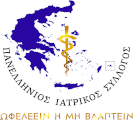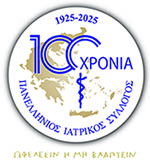The scope of the Panhellenic Medical Association includes:
- To support the Health Minister in addressing health matters, improving population healthcare, and enhancing public health through regular knowledge and experience sharing among Medical Associations, along with coordinating their goals and activities.
- to advocate for the rights of all physicians who are registered within the local medical associations that form the Panhellenic Medical Association and to offer advice, updates and continuing medical education in important areas that concern the physician, healthcare facilities and social life.
- to collaborate with the university authorities and the competent bodies regarding the number of admissions to the medical schools, the transfers, the recognition of university titles and studies abroad, as well as the formation of medical curriculum.
- to cooperate for the establishment of a unified legislative regulation with proposals to the political leadership regarding the rights and obligations of physicians and the basic principles that should govern the practice of the medical profession in all sectors.
- to safeguard the legal professional interests/rights of the physicians in every sector, to ensure a decent professional and scientific practice of medicine both in the public and private sector, to ensure the collective representation of physicians for signing contracts with organizations or other bodies for provision of medical services.
- to represent and support the positions of the medical community regarding medical issues and healthcare policies.
- To ensure everything is required for lifelong learning, continuing medical education and continuing professional development.
- to ensure the quality of the medical services.
- The development of relations with medical public and private bodies/organizations and with National Medical Associations abroad.
- Developing and recommending ethical guidelines and professional standards for medical practice, translating European and international ethical codes and declarations from organizations like the World Medical Association and the Standing Committee of European Doctors into Greek. To regulate issues of continuing medical education as well as to regulate the evaluation of continuing medical education and medical specialties regarding the content, duration and its purposes, with criteria proposed by the Panhellenic Medical Association.
These objectives can be achieved by the following means:
α) Coordination of the actions of the Medical Associations on general matters and cooperation with them to facilitate their smooth and legal functioning.
b) Ensuring adherence to medical ethics rules and fostering high moral and ethical standards within the medical field.
(c) Advancing viewpoints and insights on matters related to public health, environmental concerns, education, ongoing medical education, medical professionals’ training, and ethical standards in medicine.
(d) Expression of opinions on draft bills, draft presidential decrees and regulations relating to public health or the medical profession.
e) Overseeing the quality of medical services in primary, secondary, and tertiary healthcare across both public and private sectors.
f) Analyzing health-related problems and organizing medical scientific events through specialized committees.
g) Issuing press statements and managing websites focused on scientific or union-related matters to offer doctors comprehensive scientific and professional information and facilitate communication with local medical associations.
h) Representation of physicians in Greece or nomination of delegates in all international and European Medical Organizations, bodies and institutes for the defense and upgrading of the medical profession, in which representatives of physicians from each country participate, and in particular in the World Medical Association (WMA), the Standing Committee of European Physicians (CPME) and the European Union of Medical Specialists (UEMS/EACCME), as well as all other international organizations that the Board of the Panhellenic Medical Association (PhMA) decide.
i) Nomination of delegates within the World Health Organisation.
j) Participation in health boards and committees dealing with medical and public health issues, when provided for in specific provisions.
(ja) Establishment of scientific committees to deal with matters concerning doctors and public health issues
(jb) Participation, with a delegate appointed by the PhMA Board, at the Boards of the National Healthcare Service and all insurance organizations.
(jc) Granting of medical licences or certificates, where applicable.
(jd) Issuing of certificates of titles in specialised medicine.
(je) Advocating for doctors to protect their legal rights in various legal forums, including civil, criminal, and administrative courts, both domestically and internationally, notably before the European Court of Human Rights. Similarly, it advocates for public health and environmental protection legal interests before all relevant courts and authorities.
(jf) To supervise and coordinate, based on its objectives as the highest scientific and institutional body, in accordance with its purposes, the Medical Associations, Medical Societies and professional Associations/Unions of Medical Specialists, especially those represented in the European Union of Medical Specialists (U.E.M.S.) or nominate delegates to the European Union of Medical Specialists (U.E.M.S.) following approval by the PhMA Board.
(jg) The monitoring, coordination, and supervision of medical scientific events CME/CPD, as well as relative activities of medical associations, scientific societies, and other bodies.
(jh) The establishment of scientific committees on health issues or issues of the legal interests of doctors.
(ji) The establishment of institutes for the study of health promotion and continuing medical education.

